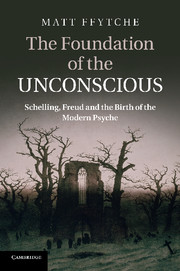Book contents
- Frontmatter
- Contents
- Acknowledgements
- Introduction: the historiography of the unconscious
- Part I The subject before the unconscious
- Part II The Romantic unconscious
- Part III The psychoanalytic unconscious
- 6 Freud: the Geist in the machine
- 7 The liberal unconscious
- Conclusion
- Bibliography
- Index
- References
7 - The liberal unconscious
Published online by Cambridge University Press: 05 December 2011
- Frontmatter
- Contents
- Acknowledgements
- Introduction: the historiography of the unconscious
- Part I The subject before the unconscious
- Part II The Romantic unconscious
- Part III The psychoanalytic unconscious
- 6 Freud: the Geist in the machine
- 7 The liberal unconscious
- Conclusion
- Bibliography
- Index
- References
Summary
What has been manifesting itself as either a structural instability over genetic sequence in the psyche, or equally an ambivalence over the nature of unconscious wishes, wears a different face if we simply ask: how clearly defined are the general features of selfhood for Freud at this stage? Immediately we are confronted with a polyphony of voices – and I mean not the eventual subdivision of ‘internal’ voices within the psyche into id, ego and superego, but the multiple versions of the self which emerge from the conflicting interpretations of Ich and Ich-heit. Straight off, we can identify at least one major dichotomy in the ‘I’, which is the way it refers in The Interpretation of Dreams to both that principle which is identified with rational consciousness, but also to what we might call the selfhood of the self as an independently motivated being. The first of these covers a range of different assumptions: the Ich can imply for Freud an abstract ‘reality principle’, a kind of objectivity we might say, though one grounded in general experience. It is this association that emerges from Freud’s description of the primary and secondary processes which he will elaborate further in a paper of 1911, ‘Formulations on the Two Principles of Mental Functioning’. With a slightly different kind of emphasis it can refer to the civilised aspect of consciousness. Bruno Bettelheim suggests that ‘when Freud names the reasonable, conscious aspects of our mind the I, we feel subtly flattered that our real I is what we value most highly in ourselves’. More strongly than this it can imply rationalism: a specific adherence to transparency and logic in conscious thinking, contrasted with the anti-logic of the unconscious. Eric Fromm, for instance, draws this implication out when illustrating Freud’s model of mind: ‘If all that is real were conscious, then indeed man would be a rational being; for his rational thought follows the laws of logic.’ But these comprise only one set of meanings for the I, all of which are to some extent related to each other.
- Type
- Chapter
- Information
- The Foundation of the UnconsciousSchelling, Freud and the Birth of the Modern Psyche, pp. 255 - 273Publisher: Cambridge University PressPrint publication year: 2011



